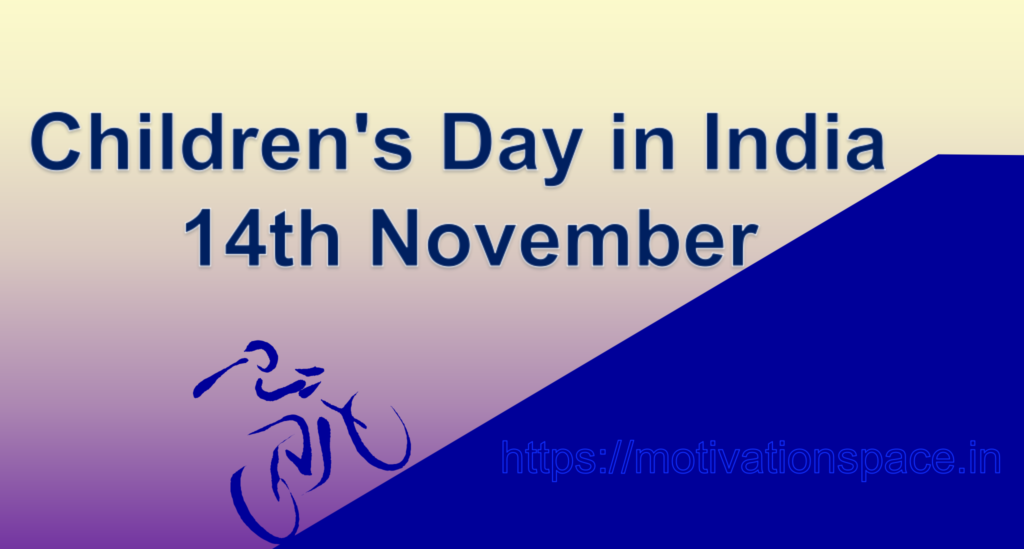Contents of this article
Children’s Day in India: Celebrating the Future. Children’s Day in India, celebrated on November 14th each year, is a day dedicated to children and their well-being. This special occasion honors the birthday of Jawaharlal Nehru, India’s first Prime Minister and a prominent advocate for children’s rights. Children’s Day is an opportunity to celebrate the creativity, vitality, and potential of India’s youth. In this blog, we will explore the history, significance, and traditions of Children’s Day in India, along with the importance of nurturing the nation’s future generation.
The History of Children’s Day in India
Children’s Day in India has a rich history that can be traced back to the fondness Jawaharlal Nehru had for children. Nehru, often affectionately referred to as “Chacha Nehru,” or Uncle Nehru, was known for his charismatic and compassionate personality. He was deeply committed to the welfare and education of children, and his birthday, November 14th, was chosen as the date to celebrate Children’s Day in his memory.
This celebration serves to honor not only the legacy of a remarkable leader but also to emphasize the importance of providing children with love, care, and education to help them become responsible, informed citizens and leaders of the future.
The Significance of Children’s Day
Children’s Day is not merely a holiday; it carries deep significance for India. It serves as a reminder of the following. Children’s Day holds a profound significance in India for several reasons:
Celebrating Childhood:
It’s a day to celebrate the innocence, playfulness, and curiosity of children.
Remembering Nehru:
It pays homage to Jawaharlal Nehru and his dedication to children’s welfare.
Promoting Education:
The day reinforces the importance of education and awareness for children.
Fostering Creativity:
Children’s Day encourages creativity, artistic expression, and cultural activities among young minds.
Building a Strong Foundation:
It serves as a reminder that the future of the nation depends on the health, education, and development of its children.
The Importance of Childhood:
Childhood is a precious phase of life when children should be allowed to be carefree, learn, play, and grow. It is a time to be cherished and protected.
Nurturing Tomorrow’s Leaders:
Children represent the future of any nation. By investing in their well-being and education, we are investing in the nation’s future leaders and change-makers.
Jawaharlal Nehru’s Legacy:
Children’s Day is an occasion to remember and honor the vision of Pandit Jawaharlal Nehru, a leader who believed in the potential of every child.
Promoting Education:
Education is a fundamental right, and Children’s Day emphasizes the importance of quality education for all children.
Fostering Creativity:
It encourages children to explore their creativity, express themselves, and take part in cultural activities and programs.
Traditions and Celebrations
Children’s Day in India is celebrated with a great deal of enthusiasm. Here are some common traditions and activities associated with this special day:
School Celebrations:
Schools and educational institutions organize events, programs, and cultural activities to celebrate Children’s Day. This often includes performances, music, dance, and skits by students.
Art Competitions:
Many schools conduct art and craft competitions, allowing children to showcase their creativity and talent.
Special Assemblies:
Schools often host special assemblies, during which teachers and students pay tribute to Nehru and discuss the significance of the day.
Storytelling and Reading Sessions:
Libraries and community centers may organize storytelling and reading sessions for children, promoting the love of literature.
Sporting Events:
Some schools organize sports competitions and games to encourage physical activity and teamwork among children.
Volunteering and Charity:
Children’s Day is also a time for teaching young minds about the value of charity and volunteering. Many organizations encourage children to participate in charitable activities.
Cultural Events:
Cultural organizations and communities host various events and exhibitions, showcasing Indian traditions and customs.
The Importance of Children’s Rights
Children’s Day is not just about celebrating children but also about recognizing and advocating for their rights. The United Nations Convention on the Rights of the Child (CRC), which India ratified in 1992, outlines a comprehensive set of rights for children. These rights include:
Right to Education:
Every child has the right to education, and efforts must be made to ensure that education is accessible, inclusive, and of high quality.
Right to Health:
Children have the right to enjoy the highest attainable standard of health. This includes access to healthcare, clean water, and nutritious food.
Right to Protection:
Children have the right to protection from all forms of violence, exploitation, and abuse.
Right to Identity:
Children have the right to an identity, including a name and nationality, from birth.
Right to Participation:
Children have the right to express their views freely and have those views taken into account on matters that affect them.
Right to Play and Leisure:
Children have the right to engage in play, recreation, and cultural activities appropriate to their age.
Right to a Safe Environment:
Children have the right to live in an environment that fosters their well-being, with access to clean air, safe drinking water, and protection from environmental pollution.
The Future of India
Children are the future of any nation, and nurturing their potential and well-being is essential for the prosperity and progress of India. Celebrating Children’s Day is not just about festivities but also about emphasizing the importance of quality education, health, and protection for all children.
India has made significant strides in improving children’s access to education and healthcare in recent years. The government has launched initiatives like the “Sarva Shiksha Abhiyan” to ensure universal access to quality education and the “Poshan Abhiyan” to address child malnutrition. These efforts are crucial in ensuring that children grow up in a nurturing environment that allows them to reach their full potential.
Celebrations on Children’s Day
Children’s Day in India is a day of delight and celebration. The festivities are marked by various activities, and children often take the lead in organizing and participating in them. Here are some common traditions and celebrations:
School Programs:
Schools across the country organize special events, functions, and cultural programs. Students actively participate by singing, dancing, and performing skits.
Art and Craft Competitions:
Many schools conduct art and craft competitions, allowing children to showcase their creative talents.
Games and Sports:
Some schools organize outdoor sports and games, encouraging children to engage in physical activities and develop a spirit of sportsmanship.
Distribution of Gifts:
Children often receive gifts, sweets, and treats from their teachers, parents, and elders, making the day even more special.
Storytelling and Reading Sessions:
Libraries, community centers, and bookstores may organize storytelling sessions and reading activities, promoting the love of literature.
Community Service:
Many organizations and communities encourage children to participate in charity and volunteer activities, teaching them the value of giving back.
Cultural Exhibitions:
Cultural organizations and local communities may host exhibitions, showcasing India’s rich traditions and customs.
The Road Ahead: Investing in India’s Youth
Children’s Day not only celebrates the vibrant energy and potential of India’s youth but also reminds us of the responsibility we hold in shaping their future. In a nation with a population predominantly comprising young people, investing in their education, health, and well-being is not just a choice; it is a necessity.
India has made commendable strides in this direction. Initiatives such as the Right to Education Act, Mid-Day Meal Scheme, and Swachh Bharat Abhiyan, among others, have been aimed at improving the lives of children. However, there is still much work to be done. Access to quality education, nutrition, healthcare, and safe environments remains a challenge for many children, particularly in rural and underprivileged areas.
As we celebrate Children’s Day, let us reflect on the importance of providing equal opportunities to every child, regardless of their background. Let us recommit to ensuring that children receive the care, support, and education they need to blossom into responsible, compassionate, and empowered individuals. By nurturing our children, we are not just celebrating their potential; we are building a brighter future for India and the world.
Conclusion for Children’s Day in India
Children’s Day in India is a day of celebration and reflection. It is a day to recognize the potential and rights of the nation’s youth, to remember the legacy of Jawaharlal Nehru, and to commit to providing a safe, nurturing, and enriching environment for all children. As we celebrate this day, let us reiterate our dedication to the welfare of India’s children, for they are the ones who will shape the nation’s future and carry its legacy forward. Feel free to contact us about any topic or content of this website.


